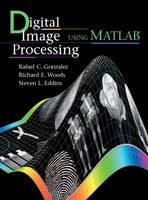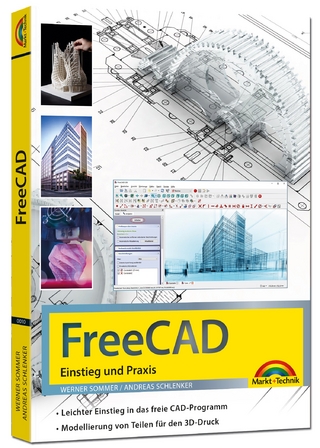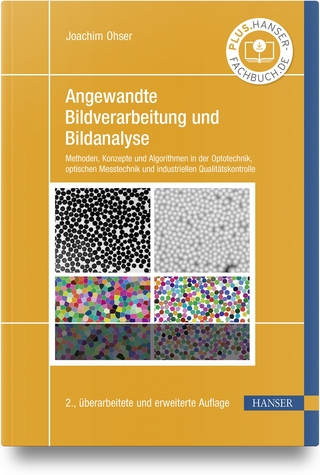
Digital Image Processing Using MATLAB®
Pearson (Verlag)
978-0-13-008519-1 (ISBN)
- Titel ist leider vergriffen;
keine Neuauflage - Artikel merken
For Image and Computer Vision, Image Processing, and Computer Vision courses.
This is the first text that provides a balanced treatment of image processing fundamentals and an introduction to software principles used in the practical application of image processing. A seamless integration of material from the leading text, Digital Image Processing by Gonzalez and Woods and the Image Processing Toolbox from Mathworks, Inc. This text works in the MATLAB computing environment; the Toolbox provides a stable, well-supported set of software tools capable of addressing a broad spectrum of applications in digital image processing. The major areas covered include intensity transformations, linear and nonlinear spatial filtering, filtering in the frequency domain, image restoration and registration, color image processing, wavelets, image data compression, morphological image processing, image segmentation, regions and boundary representation and description, and object recognition.
Rafael C. Gonzalez. R.C. Gonzalez received the B.S.E.E. degree from the University of Miami in 1965 and the M.E. and Ph.D. degrees in electrical engineering from the University of Florida, Gainesville, in 1967 and 1970, respectively. He joined the Electrical and Computer Engineering Department at the University of Tennessee, Knoxville (UTK) in 1970, where he became Associate Professor in 1973, Professor in 1978, and Distinguished Service Professor in 1984. He served as Chairman of the department from 1994 through 1997. He is currently a Professor Emeritus of Electrical and Computer Engineering at UTK. He is the founder of the Image & Pattern Analysis Laboratory and the Robotics & Computer Vision Laboratory at the University of Tennessee. He also founded Perceptics Corporation in 1982 and was its president until 1992. The last three years of this period were spent under a full-time employment contract with Westinghouse Corporation, who acquired the company in 1989. Under his direction, Perceptics became highly successful in image processing, computer vision, and laser disk storage technologies. In its initial ten years, Perceptics introduced a series of innovative products, including: The world's first commercially-available computer vision system for automatically reading the license plate on moving vehicles; a series of large-scale image processing and archiving systems used by the U.S. Navy at six different manufacturing sites throughout the country to inspect the rocket motors of missiles in the Trident II Submarine Program; the market leading family of imaging boards for advanced Macintosh computers; and a line of :trillion-byte laser disk products. He is a frequent consultant to industry and government in the areas of pattern recognition, image processing, and machine learning. His academic honors for work in these fields include the 1977 UTK College of Engineering Faculty Achievement Award; the 1978 UTK Chancellor's Research Scholar Award; the 1980 Magnavox Engineering Professor Award; and the 1980 M. E. Brooks Distinguished Professor Award. In 1981 he became an IBM Professor at the University of Tennessee and in 1984 he was named a Distinguished Service Professor there. He was awarded a Distinguished Alumnus Award by the University of Miami in 1985, the Phi Kappa Phi Scholar Award in 1986, and the University of Tennessee's Nathan W Dougherty Award for Excellence in Engineering in 1992. Honors for industrial accomplishment include the 1987 IEEE Outstanding Engineer Award for Commercial Development in Tennessee; the 1988 Albert Rose National Award for Excellence in Commercial Image Processing; the 1989 B. Otto Wheeley Award for Excellence in Technology Transfer; the 1989 Coopers and Lybrand Entrepreneur of the Year Award; the 1992 IEEE Region 3 Outstanding Engineer Award; and the 1993 Automated Imaging Association National Award for Technology Development. Dr. Gonzalez is author or co-author of over 100 technical articles, two edited books, and five textbooks in the fields of pattern recognition, image processing, and robotics. His books are used in over 500 universities and research institutions throughout the world. He is listed in the prestigious Marquis Who's Who in America, Marquis Who's Who in Engineering, Marquis Who's Who in the World, and in 10 other national and international biographical citations. He is the co-holder of two U.S. Patents, and has been an associate editor of the IEEE Transactions on Systems, Man and Cybernetics, and the International Journal of Computer and Information Sciences. He is a member of numerous professional and honorary societies, including Tau Beta Pi, Phi Kappa Phi, Eta Kappa Nu, and Sigma Xi. He is also a Fellow of the IEEE. Richard E. Woods earned his B.S., M.S., and Ph.D. degrees in Electrical Engineering from the University of Tennessee, Knoxville. His professional experiences range from entrepreneurial to the more traditional academic, consulting, governmental, and industrial pursuits. Most recently, he founded MedData Interactive, a high technology company specializing in the development of handheld computer systems for medical applications. He was also a founder and Vice President of Perceptics Corporation, where he was responsible for the development of many of the company's quantitative image analysis and autonomous decision making products. Prior to Perceptics and MedData, Dr. Woods was an Assistant Professor of Electrical Engineering and Computer Science at the University of Tennessee and priors to that, a computer applications engineer at Union Carbide Corporation. As a consultant, he has been involved in the development of a number of special-purpose digital processors for a variety of space and military agencies, including NASA, the Ballistic Missile Systems Command, and the Oak Ridge National Laboratory. Dr. Woods has published numerous articles related to digital signal processing and is co-author of Digital Image Processing, the leading text in the field. He is a member of several professional societies, including Tau Beta Pi, Phi Kappa Phi, and the IEEE. In 1986, he was recognized as a Distinguished Engineering Alumnus of the University of Tennessee. Steven L. Eddins is development manager of the image processing group at The MathWorks, Inc. He led the development of several versions of the company's Image Processing Toolbox. His professional interests include building software tools that are based on the latest research in image processing algorithms, and that have a broad range of scientific and engineering applications. Prior to joining The MathWorks, Inc. in 1993, Dr. Eddins was on the faculty of the Electrical Engineering and Computer Science Department at the University of Illinois, Chicago. There he taught graduate and senior-level classes in digital image processing, computer vision, pattern recognition, and filter design, and he performed research in the area of image compression. Dr. Eddins holds a B.E.E. (1986) and a Ph.D. (1990), both in electrical engineering from the Georgia Institute of Technology. He is a member of the IEEE.
1. Introduction.
2. Fundamentals.
3. Intensity Transformations and Spatial Filtering.
4. Frequency Domain Processing.
5. Image Restoration.
6. Color Image Processing.
7. Wavelets.
8. Image Compression.
9. Morphological Image Processing.
10. Image Segmentation.
11. Representation and Description.
12. Object Recognition.
| Erscheint lt. Verlag | 12.2.2004 |
|---|---|
| Sprache | englisch |
| Maße | 185 x 236 mm |
| Gewicht | 1070 g |
| Themenwelt | Informatik ► Grafik / Design ► Digitale Bildverarbeitung |
| Informatik ► Office Programme ► Outlook | |
| Technik | |
| ISBN-10 | 0-13-008519-7 / 0130085197 |
| ISBN-13 | 978-0-13-008519-1 / 9780130085191 |
| Zustand | Neuware |
| Haben Sie eine Frage zum Produkt? |
aus dem Bereich


